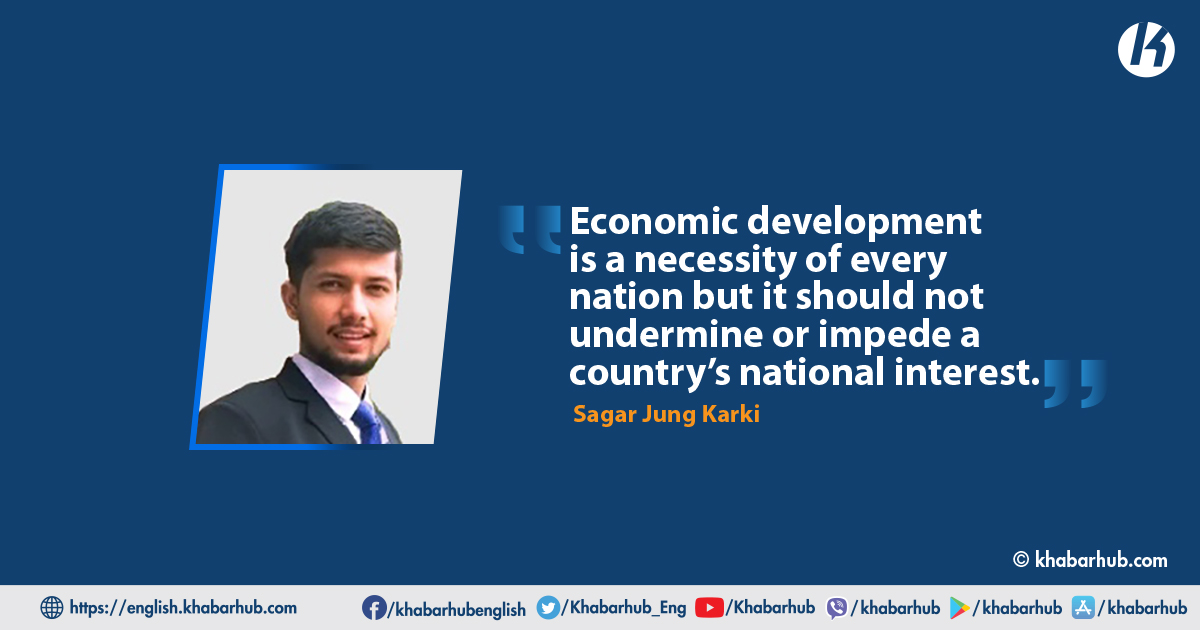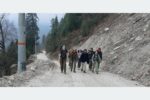The term “Indo-Pacific” first emerged in Weimar Germany as a region that could act as a possible ally for Germany during the World War.
Since then it has been used in referring to a geopolitical region that consists of countries in South Asia, East Asia, and others in the Asia Pacific region. ‘Indo-Pacific Strategy’ according to the Department of Defense, United States, envisions a linkage between security, governance, and economics.
But more than that Indo-Pacific now refers to a region with strategic economic and political interest that has been backed by western nations especially the United States to counter China’s growing influence in the region.
Nepal, a landlocked country surrounded by India and China is in a critical geopolitical space. This means that Nepal usually has difficulty in aligning the conflict of interest between the major powers in the world.
Acknowledging this situation the Indo-Pacific strategy has once again put Nepal in an ambiguous situation as far as foreign aid and economic development is concerned.
Millennium Challenge Corporation (MCC) and Nepal
The Millennium Challenge Corporation is a bilateral United States foreign aid agency established by the U.S. Congress in 2004 that aims to promote economic growth, reduce poverty and strengthen institutions.
Furthermore, non-alignment is and has been the guiding principle of Nepal’s foreign policy. Hence, Nepal does not want to get involved in the great power games of international politics.
Ever since the $500 million MCC agreement was signed in-between Millennium Challenge Corporation and the Government of Nepal in 2017, it has been a subject of controversy in Nepal.
Firstly, unlike other development assistance, the parliamentary endorsement is a mandatory requirement for the deal’s implementation.
Previous governments in Nepal tried to pass the bill for MCC but it lingered on due to disagreements among politicians of various parties.
Once again under the current government, there was some hint that the issue will be discussed in the House of Representatives to be endorsed.
Soon the protests against MCC started in the country. Additionally, the arrival of MCC’s Vice-President Fatema Z Sumar and Deputy Vice-President Johnathon Brooks in Kathmandu on 9th September 2021, followed by their meeting with the Prime Minister and senior politicians from both the ruling and opposition sides further intensified the protests as the public thought it to be a move by the US to pressure the Nepalese government to pass the bill.
Secondly, the core issue regarding MCC has been that it might possibly impose a threat to national sovereignty and security; the basis on which Sri Lanka had rejected the agreement.
MCC’s vice-president Sumar mentioned that MCC is not part of the Indo-Pacific Strategy and there is no US Army involvement in the agreement but still there are some sections in the pact that have differing views.
For instance, section 7.1 of the compact reads;’ “The parties understand that this Compact, upon entry into force, will prevail over the domestic laws of Nepal.”
Section 6.8 says “the Government agrees that MCC and the United States Government or any current or former officer or employee of MCC or the United States Government will be immune from the jurisdiction of all courts and tribunals of Nepal for any claim or loss arising out of activities or omissions under this Compact.”
These provisions stand above the laws of Nepal. So the central argument of many political leaders and citizens is that the MCC agreement should not be ratified in its current form.
Thirdly, there is a doubt on whether MCC falls under the Indo-Pacific strategy of the US or not. Nepal as an immediate neighbor of China does not want to join an alliance that could damage relations with its friendly northern neighbor.
Furthermore, non-alignment is and has been the guiding principle of Nepal’s foreign policy. Hence, Nepal does not want to get involved in the great power games of international politics.
Belt and Road Initiative vs. Indo-Pacific Strategy
The Belt and Road Initiative (BRI) is an infrastructure and development strategy of China formed in 2013. Nepal became part of BRI in 2017 after signing a memorandum of understanding.
Nine projects were identified by Nepal as part of the BRI pact: upgrading the Rasuwagadhi-Kathmandu road; Kimathanka-Hile road construction; road construction from Dipayal to the Chinese southern border, the Tokha-Bidur road, the Galchhi-Rasuwagadhi-Kerung 400kv transmission line, the Kerung-Kathmandu rail; the 762MW Tamor hydroelectricity project, the 426MW Phukot Karnali hydroelectric project; and the Madan Bhandari Technical Institute.
Although there has not been any significant progress in these projects, there are many considerable Chinese projects that are ongoing.
Nepalese have always endured tough times in the past and they possess the wisdom to decide their future.
Some of them including West Seti Dam, the Pokhara Regional International, Gautam Buddha International Airport, and the Upper Trishuli hydropower project.
If we analyze BRI and MCC we can see that both have similar aims – to expand the soft power of China and the USA respectively.
But the approach seems to be different. While China is quietly implementing its projects by gaining the trust of host governments, theUS on the other hand is trying to concretely assert its influence in a direct manner.
The Way Forward for Nepal
Nepal is a sovereign country that has a great history of being one of the few nations in the world that have not been colonized.
Therefore, Nepalese take a great sense of pride in their glorious history. But along with that Nepalese are also progressive by nature; their resilience and adaptability have been evident during several drastic political and societal changes in Nepal from the Ranas, Shah Monarchs, ten-year civil war, transition governments to a federal democratic republic.
Nepalese have always endured tough times in the past and they possess the wisdom to decide their future.
Economic development is a necessity of every nation but it should not undermine or impede a country’s national interest.
Therefore, Nepali leaders need to put national sovereignty, security, and concerns of Nepali people above everything else whether it’s with MCC, BRI, or for that matter any bilateral or multilateral project.
(Sagar Jung Karki is pursuing Master’s in International Business Management at the University of West of England offered by The British College, Kathmandu and is a Researcher at Nepal Institute of International Cooperation and Engagement)









Comment